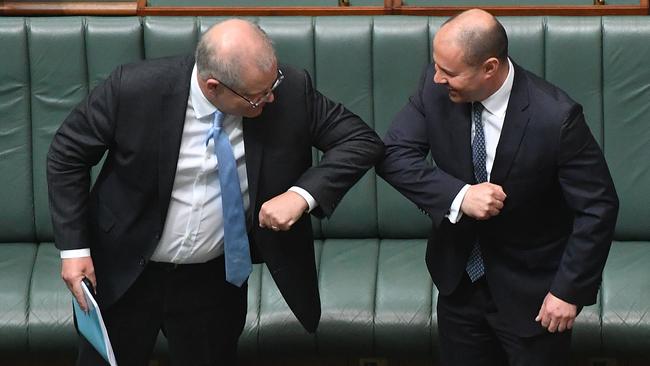Coronavirus: Treasurer won’t expand JobKeeper to include casuals
Josh Frydenberg says the $130 billion wage subsidy scheme will not be expanded to casuals and foreign workers.

Josh Frydenberg says the $130 billion wage subsidy scheme will not be expanded to casuals and foreign workers, saying the government “had to draw the line somewhere.”
“We have no plans to change the rules. We want to implement the program as passed through the parliament,” Mr Frydenberg told ABC’s Insiders on Sunday, explaining that a provision for discretion the Australian Taxation Office has when implementing the JobKeeper payment to businesses was in place “because the parliament is not sitting on its normal schedule”.
“It’s for unforeseen circumstances so if you needed to implement it in a different way with the ATO these issues may arise as the program goes to the implementation phase.
“The JobKeeper program will provide a massive financial boost to sole traders, to casuals, to part time, to full time workers, to the not for profit sector. But it’s not just the financial boost it will provide it’s also the psychological boost to the nation.”
"Skilled foreign workers, for example, they have been crucial in supporting our economic growth for years in Australia what do they get right now?" @David_Speers asks @JoshFrydenberg. #Insiders #Cororonavirus #auspol pic.twitter.com/21o5PL0ByL
— Insiders ABC (@InsidersABC) April 12, 2020
He said 802,000 businesses had applied for the JobKeeper payment as of Sunday morning.
Asked about the exclusion of casual workers who have not worked for the same employer for more than 12 months who will miss out on the $1500 a fortnight payment and will instead get the $1100 a fortnight JobSeeker payment, Mr Frydenberg said “there’s also capacity as a casual to work for a small amount of money on top (of JobSeeker)”.
He said bringing the one million ineligible casuals into the JobKeeper scheme would cost an extra $18 billion.
Mr Frydenberg also said skilled foreign workers who miss out on the payments could access up to $10,000 in their superannuation, but acknowledged some would not have accrued $10,000 in their accounts.
“Some will return back overseas … If there’s no work for them and then they can get back to their home country then that is obviously an option for them.
“At $130 billion we had to draw the line somewhere. This is a massive call on the public purse, and it is a debt that the country will pay for years to come. And at six million people on the JobKeeper program, that’s nearly half the Australian workforce.
Asked about the possible easing of social distancing and isolation restrictions, Mr Frydenberg reiterated Scott Morrison’s warning that Australians need to prepare for at least six months of the measures, and that it is dangerous to move ahead of medical advice to allow businesses to reopen.
He also pointed to a second wave of cases seen in countries like Japan and Singapor, which had initially been held up as good examples of handling the virus.
“I think it’s very dangerous and unrealistic to move ahead of the medical advice. It has served Australia well. As the Prime Minister has said ‘patience is a virtue, complacency is a problem’.
.@JoshFrydenberg: We provided up to $100,000 to small businesses, based on the size of their wage bill. That is a cash flow boost that they can use to maintain those on temporary visas or those who are casuals, who don't come within the JobKeeper program on their books. #Auspol pic.twitter.com/letbBBwfLS
— Insiders ABC (@InsidersABC) April 11, 2020
“Everyone needs to understand that this is a very fluid and difficult situation and when you look around the rest of the world, the United States, Europe, parts of Asia, even closer to home, we don’t want to have those experiences.
“I don’t have a crystal ball … we are having a degree of success in flattening out that curve but it is dangerous to move ahead of the medical advice.”
Mr Frydenberg also said the coronavirus pandemic had exposed issues with Australia’s reliance on foreign production for certain goods including medical equipment, and that “there’s going to have to be a proper assessment of those global supply chains and what they mean for Australia”.
While he foreshadowed a reinvestment in domestic production of some goods, he warned “this should not be seen as an argument for protectionism”.




To join the conversation, please log in. Don't have an account? Register
Join the conversation, you are commenting as Logout